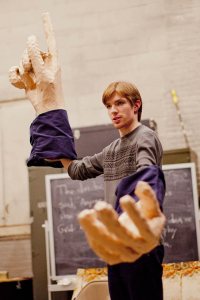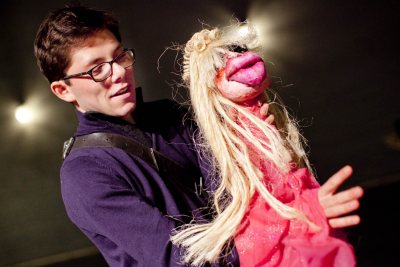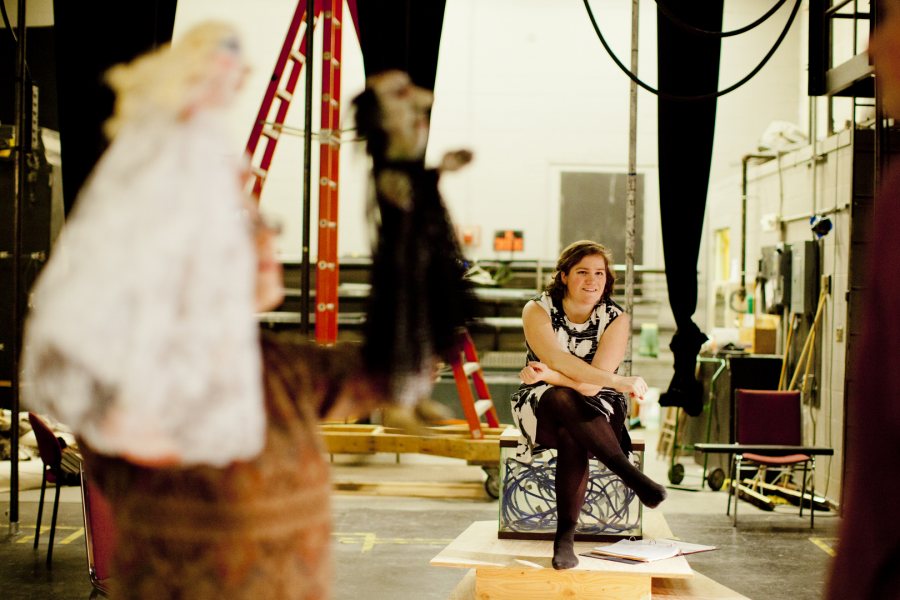
In morality play, Pendergast ’15 tells ‘story of Mankind from birth till death’
A medieval morality play adapted for today’s audience, the Bates College production of The Castle of Perseverance is presented in performances at 7:30 p.m. Thursday, Friday and Monday, March 5, 6 and 9; and at 5 p.m. Saturday and 2 p.m. Sunday, March 7-8, in Schaeffer Theatre, 329 College St.
Admission is $6/$3, and tickets are available at batestickets.com. For more information, please call 207-786-6161.
Max Pendergast of Greenwich, Conn., a senior double-majoring in English and theater, adapted and is directing The Castle of Perseverance for her senior thesis in theater. (In addition to the work on the production itself, the thesis requires a reflective or analytical written component.)

James Erwin ’18 portrays “Shift” in the Bates production of “The Castle of Perseverance.” (Phyllis Graber Jensen/Bates College)
Most popular in Europe during the 15th and 16th centuries, morality plays were intended to spread Christian doctrine among lay audiences. (Everyman may be the most familiar example of the genre.) The plays are allegories whose characters portray good and bad aspects of human character, rather than three-dimensional personalities.
Its author unknown, The Castle of Perseverance is one of the few 15th-century morality plays still extant. The play’s central figure is Mankind, who is tempted and dissuaded by a series of vices and virtues such as Covetousness and Patience.
Pendergast explains, “It’s the story of Mankind from birth until death — how he follows the vices, then follows the virtues, then the vices again. Then he dies and the question is: Is he going to be saved?” It is a play about the universality of human experiences, written to strike a chord with each audience member.
Adding to the production’s symbolic and allegorical power is Pendergast’s use of puppetry. Puppets are a neutral medium, she explains — a blank dramatic canvas — that allows the actor to imbue them with their own emotions. “Puppets don’t have a history,” the director says. “They are as expressive as the actor makes them.”
Pendergast points out that Perseverance is one of the first known theatrical manuscripts equipped with a stage plan. This plan situates the action in the middle of the audience, a setting called “in the round.” In its Bates production, Perseverance honors these original plans by seating the audience around the performers on the Schaeffer Theatre stage.
Pendergast finds this staging well-suited to the content of the play, and is excited about its effect on the audience’s experience. It will enhance viewers’ identification with Mankind, she says. “In the round you have a certain intimacy that something like a proscenium or thrust stage doesn’t really give you.”

Playing the role of “Sloth, Gluttony and Lechery,” Ben Wilentz ’16 maneuvers a puppet during a rehearsal for “The Castle of Perseverance.” (Phyllis Graber Jensen/Bates College)
What drew Pendergast to the play for her thesis topic is her deep-rooted interest in medieval drama, a topic she also pursued for her English thesis during the fall semester. For Pendergast, plays like The Castle of Perseverance are remarkably abstract for their time.
Despite the didactic origins of the morality play, Perseverance focuses not so much on religious doctrine, Pendergast feels, as it does on humanistic, ethical questions. Updating the play for a contemporary audience reveals the inherent timelessness of such medieval texts. Their themes resound with the daily choices we make between good and evil and the dilemmas of the gray spaces in between.
The Castle of Perseverance presents a dynamic and immersive experience centered around Mankind, who ultimately learns to make his own choices. “I would love it if the play left the audience with a sense of control over their own lives,” Pendergast says.
“I want the play to make the audience think about themselves as Mankind, to have the play’s abstract theatricality become an internal experience.”





